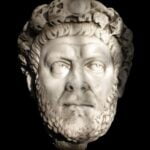The persecution of Christians under Emperor Decius (249-251 CE), unlike many previous ones, covered the entire empire. Initially, the action was carried out very consistently, and hundreds, if not thousands, were killed. One of the most significant was Pope Fabian, Bishop of Rome from 236-250 CE.
This fate was shared by many commune heads in various cities, and many had to live in hiding. The situation in Alexandria was so different that the pagan people there had already committed bloody excesses against Christians. The bishop of Alexandria, Dionysius, tells in a preserved letter about what happened after the publication of the Edict of Decius.
Fear took over everyone. Immediately many of the most distinguished appeared before the committees, some out of fear, others as officials were called out by their duties, and others were finally drawn to their entourage. Called by name, they stood up to the unclean and ungodly sacrifices, some clothed with pallor and trembling, not like sacrifices but destined to idols for sacrifice and slaughter; and so the great crowd around them mocked them. It turned out that they were completely cowardly under the skin, both for dying and for sacrifice. Others, however, approached the altars more eagerly and assured them with their foreheads high that they had never been Christians in their lives (…). Others, finally, followed one or the other’s example or escaped. Some were seized, some of them persisted to the point of being shackled and thrown into prison, while others remained locked for days and then swore before they were brought before the tribunal. Others, up to a certain point, suffered torture but did not want to go to any further torment.
– Krawczuk Aleksander, Poczet cesarzy rzymskich, ISKRY, Warsaw 1986
Dionysius himself was saved almost by a miracle. After receiving the edict, the prefect immediately sent one of the officers to bring the bishop. However, Dionysius, instead of hiding somewhere, waited for this officer at home. Why? Nobody knows that. The bishop of Alexandria waited patiently – four days.
Meanwhile, as the bishop relates, he ran around looking for me, searching roads, rivers and fields, wherever he suspected I was hiding or where I was walking. He was blind that he had not searched my house, because he had no idea that I, whom they were chasing, was staying at home. And reluctantly, after only four days, when God told me to leave, and when He miraculously opened the way for me, I went out with the children and many brothers.
– Krawczuk Aleksander, Poczet cesarzy rzymskich, ISKRY, Warsaw 1986
Nowadays, the search begins with checking the wanted house, but if it had not been for this great defeat of the Roman prefect, his successors would not have received the instruction “also search his household”.






